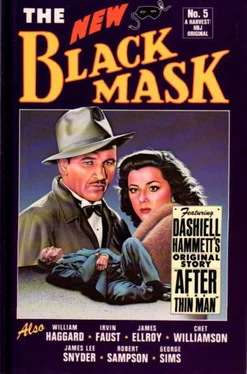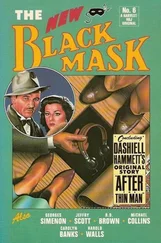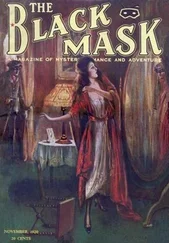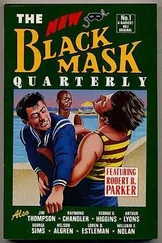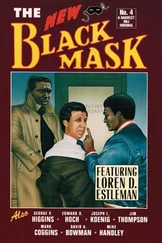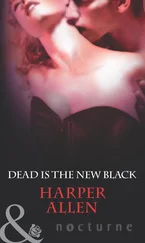William Haggard - The New Black Mask (No 5)
Здесь есть возможность читать онлайн «William Haggard - The New Black Mask (No 5)» весь текст электронной книги совершенно бесплатно (целиком полную версию без сокращений). В некоторых случаях можно слушать аудио, скачать через торрент в формате fb2 и присутствует краткое содержание. Год выпуска: 1986, ISBN: 1986, Издательство: A Harvest/HJB book Harcourt Brace Jovanovich, Жанр: Детектив, на английском языке. Описание произведения, (предисловие) а так же отзывы посетителей доступны на портале библиотеки ЛибКат.
- Название:The New Black Mask (No 5)
- Автор:
- Издательство:A Harvest/HJB book Harcourt Brace Jovanovich
- Жанр:
- Год:1986
- ISBN:9780156654845
- Рейтинг книги:4 / 5. Голосов: 1
-
Избранное:Добавить в избранное
- Отзывы:
-
Ваша оценка:
- 80
- 1
- 2
- 3
- 4
- 5
The New Black Mask (No 5): краткое содержание, описание и аннотация
Предлагаем к чтению аннотацию, описание, краткое содержание или предисловие (зависит от того, что написал сам автор книги «The New Black Mask (No 5)»). Если вы не нашли необходимую информацию о книге — напишите в комментариях, мы постараемся отыскать её.
The New Black Mask (No 5) — читать онлайн бесплатно полную книгу (весь текст) целиком
Ниже представлен текст книги, разбитый по страницам. Система сохранения места последней прочитанной страницы, позволяет с удобством читать онлайн бесплатно книгу «The New Black Mask (No 5)», без необходимости каждый раз заново искать на чём Вы остановились. Поставьте закладку, и сможете в любой момент перейти на страницу, на которой закончили чтение.
Интервал:
Закладка:
Pausing in the hall, Patchin set light to a pile of paraffin-soaked sawdust and then lit the trails of wood chips and retreated to the sagging front door, throwing the box of matches behind him.
The fire had taken a firm grip on the cottage before Patchin had even left the garden; he could hear it raging and roaring unseen until a sheet of flame sprang up at one of the diamond-leaded windows. For the second time that day, Patchin experienced a slight attack of nerves; momentarily his right hand shook, and for a few minutes he seemed to be walking on lifeless legs, having to make an extraordinary amount of effort just to propel himself along.
Seated in his van, Patchin took out a large handkerchief and wiped his forehead, which was sweating profusely, and allowed himself a few minutes’ rest before driving off in his customary careful manner. Was there something he had overlooked, perhaps a trifling slip which might lead the police to his door in a few days’ time? As he navigated a series of lanes and minor roads that would put him once again on the main road from Hambleden to Pasterne, his mind was exercised by the nagging suspicion that he might have made one vital mistake.
Calm gradually returned as he drove slowly along, and he began to think of the possible effect of the fire on the Benningworth estate. The large garden of rank grass and weeds should act as a barrier between the fire and Calcot Wood, but even if it did spread, Lord Benningworth owed him a favour for all the hard work he had put in there as amateur forester for twenty-five years. A sudden thought made Patchin smile. The Benningworth family motto, Esse quam videre, ‘To be rather than to seem to be,’ was well known in the locality; it was a pity that Ray Johnson had not known that Daniel Patchin also had a motto: “What I have I hold.”
When Patchin arrived in Pasterne he felt completely normal. His pleasant life had been momentarily threatened with an upheaval, but that was now all over. The village looked particularly lovely in the late afternoon sunlight. The white ducks were sedulously paddling to and fro as though they were paid to do so, and swifts were skimming over the clear pond’s mirrorlike surface, occasionally dipping down to it hunting midges. The postmistress’s black and white cat moved carefully over the neatly clipped grass as if it might be stalking a newt and sat down at the edge of the pond. “Pretty as a picture,” Patchin said.
Walking along to Pound Cottage, Daniel Patchin thought of what he should say when he saw Angela. It was essential to appear absolutely as normal so that when she heard of the perplexing tragedy in Calcot Wood nothing about his behaviour should prompt suspicion in her mind. Then he understood Angela’s difficulty in appearing quite normal or saying anything about that walk she had taken on the glorious May afternoon, because phrases that he went over in his mind seemed artificial and suspicious. “Nice afternoon, but I didn’t catch anything” — false. “I enjoyed it, but not good fishing weather” — unnatural.
But Patchin need not have worried, for as soon as he opened the side door he heard the squeak of protesting bedsprings and Angela calling out in a voice that sounded false and unnatural.
James Ellroy
High Darktown
James Ellroy is a 38-year-old high school dropout who has displayed remarkable proficiency as a novelist. His first book, Brown’s Requiem was nominated for a Private Eye Writers of America Shamus Award. His second, Clandestine, was nominated for a Mystery Writers of America Edgar and won a medal from the West Coast Review of Books. His subsequent novels, from the Mysterious Press — Blood on the Moon and Because the Night — begin a quintet about LA policeman Lloyd Hopkins. The third volume, Suicide Hill, is scheduled for spring 1986.
Lee Blanchard, the detective in “High Darktown,” is a main character in Mr. Ellroy’s novel-in-progress to be called The Black Dahlia. The novel is based on a true crime case — the 1947 Los Angeles murder of a hauntingly beautiful black-clad woman. Mr. Ellroy hints that Blanchard will prove himself to be less than heroic.
From my office windows I watched L.A. celebrate the end of World War II. Central Division Warrants took up the entire north side of City Hall’s eleventh floor, so my vantage point was high and wide. I saw clerks drinking straight from the bottle in the Hall of Records parking lot across the street and harness bulls forming a riot squad and heading for Little Tokyo a few blocks away, bent on holding back a conga line of youths with 2 by 4s who looked bent on going the atom bomb one better. Craning my neck, I glimpsed tall black plumes of smoke on Bunker Hill — a sure sign that patriotic Belmont High students were stripping cars and setting the tires on fire. Over on Sunset and Figueroa, knots of zooters were assembling in violation of the Zoot Suit Ordinance, no doubt figuring that today it was anything goes.
The tiny window above my desk had an eastern exposure, and it offered up nothing but smog and a giant traffic jam inching toward Boyle Heights. I stared into the brown haze, imagining shitloads of code 2s and 3s thwarted by noxious fumes and bumper-to-bumper revelry. My daydreams got more and more vivid, and when I had a whole skyful of A-bombs descending on the offices of the L.A.P.D. Detective Bureau, I slammed my desk and picked up the two pieces of paper I had been avoiding all morning.
The first sheet was a scrawled memo from the Day-watch Robbery boss down the hall: “Lee — Wallace Simpkins paroled from Quentin last week — to our jurisdiction. Thought you should know. Be careful. G.C.”
Cheery V-J Day tidings.
The second page was an interdepartmental teletype issued from University Division, and, when combined with Georgie Caulkins’s warning, it spelled out the beginning of a new one-front war.
Over the past five days there had been four heavy-muscle stickups in the West Adams district, perpetrated by a two-man heist team, one white, one negro. The MO was identical in all four cases: liquor stores catering to upper-crust negroes were hit at night, half an hour before closing, when the cash registers were full. A well-dressed male Caucasian would walk in and beat the clerk to the floor with the barrel of a .45 automatic, while the negro heister stuffed the till cash into a paper bag. Twice customers had been present when the robberies occurred; they had also been beaten senseless — one elderly woman was still in critical condition at Queen of Angels.
It was as simple and straightforward as a neon sign. I picked up the phone and called Al Van Patten’s personal number at the County Parole Bureau.
“Speak, it’s your nickel.”
“Lee Blanchard, Al.”
“Big Lee! You working today? The war's over!”
“No, it’s not. Listen, I need the disposition on a parolee. Came out of Quentin last week. If he reported in, I need an address; if he hasn’t, just tell me.”
“Name? Charge?”
“Wallace Simpkins, 655 PC. I sent him up myself in ’39.”
Al whistled. “Light jolt. He got juice?”
“Probably kept his nose clean and worked a war industries job inside; his partner got released to the army after Pearl Harbor. Hurry it up, will you?”
“Off and running.”
Al dropped the receiver to his desk, and I suffered through long minutes of static-filtered party noise — male and female giggles, bottles clinking together, happy county flunkies turning radio dials trying to find dance music but getting only jubilant accounts of the big news. Through Edward R. Murrow’s uncharacteristically cheerful drone I pictured Wild Wally Simpkins, flush with cash and armed for bear, looking for me. I was shivering when Al came back on the line and said, “He’s hot, Lee.”
Читать дальшеИнтервал:
Закладка:
Похожие книги на «The New Black Mask (No 5)»
Представляем Вашему вниманию похожие книги на «The New Black Mask (No 5)» списком для выбора. Мы отобрали схожую по названию и смыслу литературу в надежде предоставить читателям больше вариантов отыскать новые, интересные, ещё непрочитанные произведения.
Обсуждение, отзывы о книге «The New Black Mask (No 5)» и просто собственные мнения читателей. Оставьте ваши комментарии, напишите, что Вы думаете о произведении, его смысле или главных героях. Укажите что конкретно понравилось, а что нет, и почему Вы так считаете.
